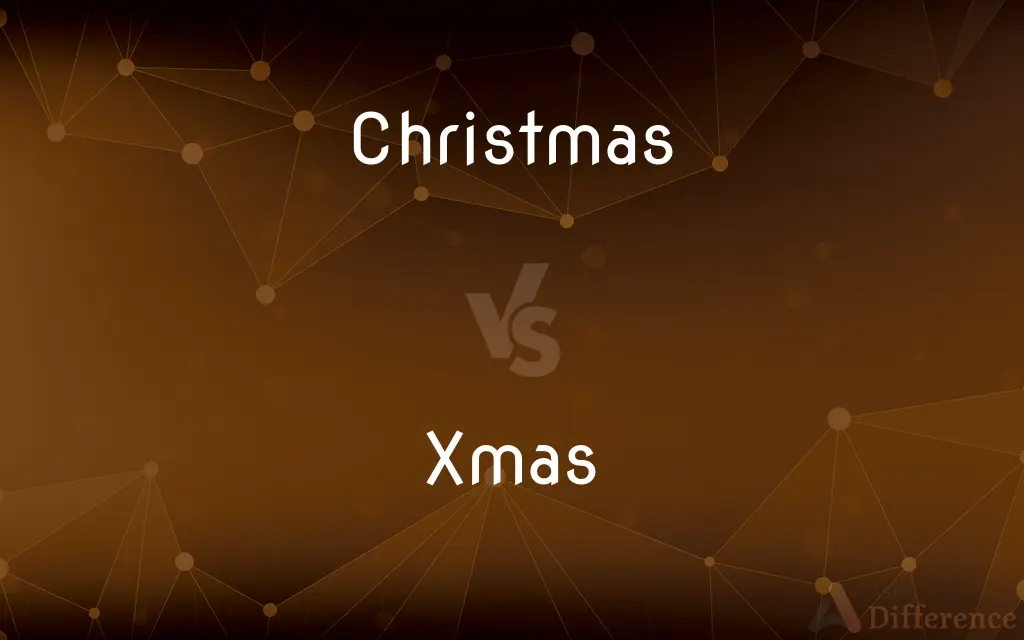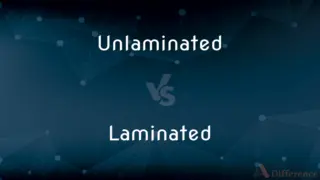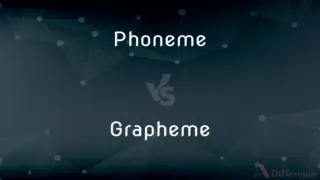Christmas vs. Xmas — What's the Difference?
By Maham Liaqat & Urooj Arif — Updated on March 15, 2024
"Christmas" is traditional term for Christian holiday celebrating the birth of Jesus Christ, encompassing religious and cultural practices. "Xmas" is a common abbreviation, where "X" represents the Greek letter Chi, the first letter of Christ in Greek.

Difference Between Christmas and Xmas
Table of Contents
ADVERTISEMENT
Key Differences
Christmas is a widely observed holiday that commemorates the nativity of Jesus Christ, celebrated on December 25th by millions around the world. It combines Christian religious ceremonies with diverse cultural traditions, such as exchanging gifts, decorating Christmas trees, and sharing festive meals. Xmas, on the other hand, is an abbreviation of Christmas, where the "X" comes from the Greek letter Chi (Χ), which is the first letter of Χριστός (Christos), meaning "Christ" in Greek. Despite misconceptions, "Xmas" is not a secular attempt to remove the religious aspect from the holiday but has historical roots in religious writings dating back to the 16th century.
The use of "Xmas" can be practical for its brevity in informal settings, advertisements, and signage. However, some people prefer the full "Christmas" for its clear reference to Christ and to maintain the traditional tone of the holiday.
While "Christmas" is universally recognized and carries the full weight of the holiday's religious and cultural significance, "Xmas" is often seen as more casual or commercial. Its use can sometimes spark debate about respect for the holiday's religious origins.
Culturally, "Christmas" evokes a wide array of traditions, music, and imagery that have developed over centuries, blending religious observance with secular customs. "Xmas," due to its abbreviated form, may not evoke the same depth of tradition but is understood as a shorthand reference to the same holiday.
Comparison Chart
Definition
The holiday celebrating the birth of Jesus Christ, observed on December 25th.
An abbreviation of Christmas, using "X" from the Greek letter Chi for Christ.
ADVERTISEMENT
Origin
"Christ's Mass," referring to the Christian service.
Abbreviation used in historical religious writings, with "X" representing "Christ" in Greek.
Usage
Formal and traditional contexts, emphasizing the full celebration and meaning.
Informal, practical contexts, often in advertisements or signage.
Cultural Significance
Encompasses a wide range of religious and secular traditions worldwide.
Seen as a shorthand, sometimes viewed as less respectful or too casual.
Historical Roots
Dates back to 4th-century Rome as the date to celebrate the birth of Jesus.
Used in religious texts since the 16th century, not inherently secular or disrespectful.
Compare with Definitions
Christmas
The annual Christian festival celebrating the birth of Jesus Christ, observed on December 25th.
The family gathered around the Christmas tree to exchange gifts.
Xmas
An abbreviation of Christmas, historically used in religious texts, with "X" representing the Greek letter Chi for Christ.
The store displayed a large Xmas Sale sign.
Christmas
A time for family gatherings, religious services, and festive meals.
They attended the midnight Christmas service at their local church.
Xmas
A common shorthand used in informal contexts or to save space in writing and advertising.
She wrote Xmas gifts on her shopping list for convenience.
Christmas
The period leading up to and including Christmas Day, often involving preparations and anticipation.
The Christmas season is her favorite time of year, filled with joy and giving.
Xmas
Used in commercial settings, often sparking debate about the commercialization of the holiday.
Critics argue that terms like Xmas contribute to the commercialization of Christmas.
Christmas
A season of goodwill and celebration, incorporating various customs and traditions.
The city was adorned with Christmas lights and decorations.
Xmas
A practical alternative in digital communication and social media for brevity.
He texted his friends Merry Xmas! to save space in his message.
Christmas
The embodiment of the spirit of giving and goodwill towards others.
They volunteered at the shelter to spread Christmas cheer among those in need.
Xmas
Sometimes perceived as a secular version of "Christmas," though not originally intended as such.
Some people prefer to use Christmas instead of Xmas to keep the focus on the holiday's religious meaning.
Christmas
Christmas is an annual festival commemorating the birth of Jesus Christ, observed primarily on December 25 as a religious and cultural celebration by billions of people around the world. A feast central to the Christian liturgical year, it is preceded by the season of Advent or the Nativity Fast and initiates the season of Christmastide, which historically in the West lasts twelve days and culminates on Twelfth Night.
Xmas
Xmas (also X-mas) is a common abbreviation of the word Christmas. It is sometimes pronounced , but Xmas, and variants such as Xtemass, originated as handwriting abbreviations for the typical pronunciation .
Christmas
A Christian feast commemorating the birth of Jesus.
Xmas
Christmas.
Christmas
December 25, the day on which this feast is observed as a public holiday in many countries.
Xmas
(informal) Xmas
Christmas
Christmastide.
Xmas
A Christian holiday celebrating the birth of Christ; a quarter day in England, Wales, and Ireland
Christmas
An annual church festival (December 25) and in some States a legal holiday, in memory of the birth of Christ, often celebrated by a particular church service, and also by special gifts, greetings, and hospitality.
Christmas
Period extending from Dec. 24 to Jan. 6
Christmas
A Christian holiday celebrating the birth of Christ; a quarter day in England, Wales, and Ireland
Christmas
Spend Christmas;
We were christmassing in New York
Common Curiosities
Is "Xmas" a modern term?
No, "Xmas" has historical roots in early Christianity, although its usage in modern times might seem more informal or secular.
Why do some people prefer "Christmas" over "Xmas"?
Some people prefer "Christmas" to maintain the full religious and cultural significance of the holiday, while others may view "Xmas" as less formal or too secular.
How should businesses choose between "Christmas" and "Xmas" in marketing?
Businesses should consider their audience and the message they want to convey; "Christmas" might be more appropriate for traditional campaigns, while "Xmas" could be used for more casual or space-constrained contexts.
Are there cultural differences in the use of "Christmas" and "Xmas"?
Yes, cultural and regional preferences can influence the choice between "Christmas" and "Xmas," with some cultures placing more emphasis on the holiday's traditional aspects.
Can "Xmas" be used in formal writing?
"Xmas" is generally considered informal and is less likely to be used in formal writing or religious contexts, where "Christmas" is preferred.
Does using "Xmas" take away from the holiday's religious meaning?
While some may perceive it that way, the abbreviation "Xmas" originally has religious roots, with "X" representing Christ in Greek.
How do digital communications affect the usage of "Xmas"?
In digital communications where brevity is often valued, such as social media or texting, "Xmas" may be used more frequently for convenience.
How do religious institutions view the term "Xmas"?
Views can vary; some religious leaders and institutions may prefer "Christmas" to emphasize the holiday's religious significance, while others may accept "Xmas" as a valid abbreviation.
Is "Xmas" more associated with commercial aspects of the holiday?
"Xmas" is often used in commercial contexts due to its brevity, which may associate it more with the holiday's commercial aspects for some people.
Can "Xmas" be considered disrespectful?
Perceptions vary; some may see it as disrespectful or too secular, while others view it as a legitimate abbreviation with historical Christian roots.
Share Your Discovery

Previous Comparison
Unlaminated vs. Laminated
Next Comparison
Phoneme vs. GraphemeAuthor Spotlight
Written by
Maham LiaqatCo-written by
Urooj ArifUrooj is a skilled content writer at Ask Difference, known for her exceptional ability to simplify complex topics into engaging and informative content. With a passion for research and a flair for clear, concise writing, she consistently delivers articles that resonate with our diverse audience.














































